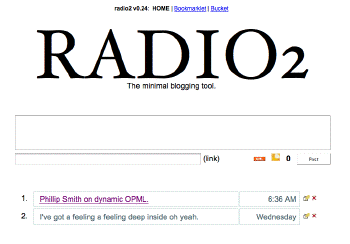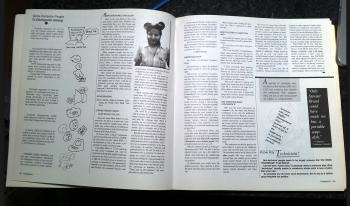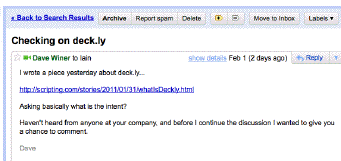
 Rebooting the News today at noon
Rebooting the News today at noon 
Here's the MP3. ![]()
 Inside Job wins Best Documentary
Inside Job wins Best Documentary 
I watched the Oscars last night, of course. A dull show, compared to years-past, made completely evident by a tribute to Bob Hope and a brief appearance by Billy Crystal. I like Anne Hathaway, and James Franco is okay. But they sucked as Oscar masters of ceremony. I'll take Alec Baldwin or Steve Martin, Whoopie and Robin. This will be the long-forgotten Oscars. And it was a fairly forgettable year at the movies, as well. Imho of course.
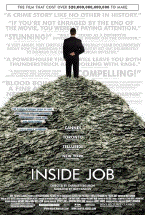 I was glad to see The King's Speech win so many awards. And was equally pleased to see The Social Network not win. The former was a surprisingly good story, and while they say it wasn't historically accurate -- the same can be said of Social Network. Seems relatively harmless to get the story of a long-dead royal wrong. But not so harmless to tell the wrong story of how software is developed, and what it's like to be a developer. That's the world we live in now, and the software stars are the new royalty. But we're not rock stars. Software is hard work, requires enormous dedication, focus and intellect and a drive to win. None of that came through in the movie about Facebook. They focused on Zuck's geekish weirdness with girlfriends and conference rooms full of lawyers and university administrators. BFD. Since when do lawyers matter? Seriously!
I was glad to see The King's Speech win so many awards. And was equally pleased to see The Social Network not win. The former was a surprisingly good story, and while they say it wasn't historically accurate -- the same can be said of Social Network. Seems relatively harmless to get the story of a long-dead royal wrong. But not so harmless to tell the wrong story of how software is developed, and what it's like to be a developer. That's the world we live in now, and the software stars are the new royalty. But we're not rock stars. Software is hard work, requires enormous dedication, focus and intellect and a drive to win. None of that came through in the movie about Facebook. They focused on Zuck's geekish weirdness with girlfriends and conference rooms full of lawyers and university administrators. BFD. Since when do lawyers matter? Seriously! ![]()
But the Oscars got one thing right -- if you haven't seen Inside Job, you must -- now.
You don't understand anything about the world you live in until you understand that the bankers are every bit as depraved as they appear to be. The media has not told the story about their bosses. Not a big surprise there, I guess. There was a moment when our political leaders were outraged, and spoke up. It's there in the movie. But we've gone back to sleep. We'll wake up again, that's for sure, and it'll be worse next time through the loop.
You can buy Inside Job on Amazon today, for delivery next week. Go get it now. It's a wonderful movie. With it we get back to a tradition of telling ourselves the truth. We need a lot of that to dig out of the mess we're in.
 Box.net raises $48 million
Box.net raises $48 million 
 I couldn't believe my eyes when I saw that number.
I couldn't believe my eyes when I saw that number.
What could a startup do with $48 million?
It's an incomprehensibly large number of dollars.
I was reminded of a similar investment I heard about a long time ago. A company named Firedrop, that had a product that looked like a loser (it was, in fact a loser) raised something like $90 million from Kleiner, Perkins, which was then the leading venture capital firm.
It didn't make sense until I realized that KP had raised a fund of over $1 billion. How could they explain that to their investors? Where would they find companies to use that much money? So (I guess) they parked big buckets of money in several of their startups, with no plans to spend it or invest it. I don't know if that theory was correct, but the fund, the investor and the company are long-gone.
It would be really interesting to get some ideas of what a company like Box.net will do with so much money.
 My Oscar picks
My Oscar picks 
Best picture: King's Speech.
Best actress: Hailee Steinfeld. (Nominated in Supporting Actress.)
Best supporting actress: Helena Bonham Carter.
Best actor: Colin Firth.
Supporting actor: Geoffrey Rush.
Best documentary: Inside Job.
Here's a list of all the nominees.
PS: I'd love to get a list of people live-blogging the Oscars. I want their feeds to turn into a river.
 Keith Richards is a hacker!
Keith Richards is a hacker! 
 Two quick mini-posts in one, both about media.
Two quick mini-posts in one, both about media.
1. Reading Keith Richards' autobiography, just starting it, but already there's been a huge payoff. Something I had never thought about. Before vinyl records there was no way to mass-exchange music between people. The new medium made it possible for Chuck Berry, Muddy Waters, Solomon Burke and Jerry Lee Lewis, all Americans, to influence two British teens, Richards and his co-Stone, Mick Jagger. He says that's why we saw an explosion in music in the 50s and 60s. Before that it was all Mozart, Beethoven and Tchaikovsky. Richards ought to know, he was a part of the explosion. And the book is an eye-opener because I, like others, assumed Richards was kind of a stoner idiot savant. Quite the opposite, he's a hacker -- a brilliant one.
2. I watched a video with David Carr and AO Scott of the NY Times. Carr said the TV networks love shows like the Oscars because of the realtime connection. I know what he means. I am a huge fan of movies, and am rooting for and against a bunch of movies that are up for awards tonight. He says the Grammys had record viewing this year because of social media. I certainly experience that, I don't know if I've ever watched the Grammys, but I did this year because of all the interesting back and forth on Twitter among my cohorts. I will of course watch the Oscars. TV and realtime networks go really well together. Glad the TV guys now see that. (And don't let Al Jazeera sweep up the whole net-based news thing while you guys are pretending it's the 90s in your news departments.)
 Radio UserLand serialnum
Radio UserLand serialnum 
 I've been keeping a copy of Radio 8 running on one of my servers so I can easily do prior art research.
I've been keeping a copy of Radio 8 running on one of my servers so I can easily do prior art research.
I had been running it for more than 30 days, so I got a message saying my Trial Version had expired and I should enter a serial number. If I didn't have one I could purchase one at the UserLand store.
Of course, the store is long-gone, so what to do?
Well it turns out I was organized enough to keep a serialnum, in the place where I would expect to find it.
U800-3V32-6705
There it is. In case anyone needs one, that should work. ![]()
PS: I uploaded the last versions of the apps to a static folder.
![]()
 Viewing RSS in a browser is broken. Here's the fix..
Viewing RSS in a browser is broken. Here's the fix.. 
I've never understood what the browsers guys do with RSS, or why they do it, but they have really made RSS a mess to deal with in the browser.
How it used to work: Click on an RSS feed you'd see XML.
Some users thought it was a bug, and reported it as such. Maybe the browser-makers got those reports too, and decided to try to do something about it.
So they obscured the XML, and showed you the headlines and descriptions and linked to the stories in the feed.
The problem with obscuring the XML is that you make it harder to understand, not easier. Why are there two ways to view the news, and why is one so plain and ugly and the other so flashy and distracting?
Analogy: Pop the hood on your car and see an incomplete image of the interior of your car.
When I pop the hood I want to see the engine. How awesome it looks! Frightening. Quickly before my mind overloads, close the hood and get in the car, turn on the radio and get on my way.
 That's how I'd like RSS to work. Click the icon. See the code. Either you're interested or you hit the back button. You can report it as a bug. Developers are familiar with the idea of bugs that never get fixed. They're called features.
That's how I'd like RSS to work. Click the icon. See the code. Either you're interested or you hit the back button. You can report it as a bug. Developers are familiar with the idea of bugs that never get fixed. They're called features. ![]()
It's very important in the minimal blogging tool that when the user clicks on the XML icon, he or she actually sees the XML. That's how I, the designer of the software, insist that it work. The RSS is the main result of their work. Any confusion about that is confusion about the product itself. And if you're a curious technically-inclined person, RSS actually interesting to read, and quite easily understood. Much more interesting than the vanilla stuff the browser guys want to present. And by having it easily visible, designers are responsible for keeping it easily understood.
So that's the bug and here's the fix...
I wrote a simple web app that displays XML and link to it from my app.
http://xmlviewer.scripting.com/?url=http://static.reallysimple.org/users/dave/linkblog.xml
It took about 15 minutes. Seriously. All it does is read the XML file, put it inside an HTML &;t;pre> element. It's hard to imagine a browser interfering with that.
It works. I recommed to developers that you stop trying to understand what the browser guys are trying to do, and write your own XML displayer, and link to it instead of the naked XML.
 Is the Verizon iPhone a flop?
Is the Verizon iPhone a flop? 
 Usually when you read a headline like Is the Verizon iPhone a flop? the answer turns out to be well in some ways yes, and in other ways no. But that's the way I do things. I'm just one person and YMMV but yes indeed, it was a flop, a huge one. A miscalculation and a misunderstanding of what people buy when they buy an iPhone and what gets them in line and salivating to get their hands on one.
Usually when you read a headline like Is the Verizon iPhone a flop? the answer turns out to be well in some ways yes, and in other ways no. But that's the way I do things. I'm just one person and YMMV but yes indeed, it was a flop, a huge one. A miscalculation and a misunderstanding of what people buy when they buy an iPhone and what gets them in line and salivating to get their hands on one.
Now my story...
I own both an AT&T iPhone 4 and a Verizon Droid.
Had Verizon offered an iPhone instead of the Droid in November 2009, I would have bought one. As would have millions of others. They likely would have taken the market from AT&T, had they had this product then.
I would have bought it then because I was fed up with the AT&T iPhone's incompetence as a phone.
But since then two things happened.
1. I solved the communication problem by getting the Droid.
2. The problem went away because I hardly ever use a phone for voice anymore, and when I do it's usuallly with Skype.
But for some reason I'm not planning on getting rid of the Droid anytime soon. I'm hassle-averse I guess. ![]()
I use the iPhone as a camera and a portable entertainment device. I use the Droid for instant messaging, email and Twitter.
I said it before they shipped, if they offered a deal that let me simplify, and cut costs without sacrificing any of the fun of using an iPhone (it is more fun than the Droid), and let me turn in my Verizon Mifi which I hardly use, then they'd get me as a customer. But the savings would have to be substantial for me to put up with the hassle of dealing with them.
Ahhh the hassle. Forgot that...
If they were as easy to deal with as the people at an Apple store I might be more inclined.
I don't know what they thought we all were doing while they were getting ready to sell their iPhone. Did they think we were all waiting for them? I wonder if they have any numbers of how many Verizon phone users also have iPhones? Would be interesting to know.
Now, what's going to happen from here for Verizon?
Next time there's a refresh, when the iPhone 5 comes out, they must have it at the same time or before AT&T. And then, if the cost to switch is the same as with AT&T, they'll get a lot of new iPhone business.
It's never all that hard to figure this stuff out. Just talk to a few users and listen to what they say. ![]()
 Random Tuesday observations
Random Tuesday observations 
 I've been working hard on software, which makes it harder to write long blog posts.
I've been working hard on software, which makes it harder to write long blog posts.
So here are a few thoughts.
When I watch people on TV in Egypt and Libya I think I'm finally seeing people as dedicated to freedom as the founders of the United States were 235 years ago. There's a lot of people who pay lip service to being patriots for their countries, but until you're willing to lay down your life for freedom, you can't know. I've never done that so I'm not saying I'm anyone to look up to. But the people in Egypt -- that's another story altogether.
Inside Job is coming out on DVD in early March. Get it and watch it and learn from it.
Almost nine years ago I quit smoking. If I can do that I can get myself off Twitter. I plan to do it.
Despite what some people say -- I did in fact develop the first blogging software. Wasn't copying anyone else. Original stuff.
Twitter and now Amazon are moving to protect their brands. I understand this, and I've been in their shoes, and have done the same. You put a lot into establishing a brand, a lot of time, money and persistence. When it comes to mean something is when other people try to take it. However it's always better to lay down the law earlier than later. It's much more fair.
I keep reading that this or that is dead. Like the web, blogging and RSS. They are all facets of the same thing, the open web. If it's dead then we're dead. Work hard to make it not so. And to people who push the idea, your deflection is showing.
And to people who say creativity is the province of youth, I'm fed up with that too. I'm now going through one of my most creative periods at age 55. I did all my work on blogging, podcasting and RSS in my 40s and 50s. All the Supreme Court justices are my age or older. Frank Gehry who is building the most astonishing apartment building in NY, a skyscraper, is 82. Great directors and film editors work as long as they want and keep doing better work and winning awards as they get older.
I do creative work. I did some things I'm very proud of in my 20s and 30s. That work laid a foundation for the work I'm doing today. But please, don't forget -- there's a big picture. And that's what young people don't really have understanding of. Bottom-line as with everything is respect. Listen to everybody, whether you want to hear from them or not. And maybe listen to the people you don't want to a little more. There's some fear there, and if you go through it you'll be richer, happier and more accomplished -- in the ways that really matter.
 We're going to try Talkshoe
We're going to try Talkshoe 
Today's a special Rebooting the News show for a few reasons.
1. It's a holiday.
2. NYU is closed.
3. Jay is out.
4. We have a guest.
5. I'm the engineer.
6. It's at 10AM not noon.
7. We're using Talkshoe.
With any luck up to 250 people will be able to listen live.
Rex Hammock, a pioneering blogger and magazine publishder, and a longtime friend, will be my guest today.
Now I'm still looking for a checklist for hosting a show.
 Tech is ready to redefine news
Tech is ready to redefine news 
Technology on the march!
For a long time, the tech industry kept to itself -- only defining what it means to process data and program computers.
 By the end of the 80s, things had changed. Laser printers and desktop publishing software, at first just toys -- were all of a sudden able to replace expensive typesetting equipment at a fraction of the cost. All of a sudden publishing was open to people with a lot less money.
By the end of the 80s, things had changed. Laser printers and desktop publishing software, at first just toys -- were all of a sudden able to replace expensive typesetting equipment at a fraction of the cost. All of a sudden publishing was open to people with a lot less money.
Movies were being redefined by Pixar and other animation studios.
Then, in the mid-90s, came the web, and publishing became almost free.
Starting in the late 90s it was time for tech to redefine what it means to be a musician, with Napster and then iTunes.
We took our first step at redefining news with RSS, also in the late 90s.
Publishing was free by the mid-90s but it wasn't easy until blogging software matured.
By the mid part of the next decade we were ready to redefine radio, with podcasting.
BitTorrent is redefining the distribution of movies.
And now, finally -- it seems -- tech is ready to fully redefine news.
What it will look like is still up for grabs. But the time is now. Just look around.
 My Ode to Rackspace
My Ode to Rackspace 
With all the development work I do here around Amazon's web services, I've been negligent in spreading the love for Rackspace.
 I have a server in their cloud, which they've kindly provided at no charge, as a sandbox for me to play in. I've done more than play there. It's been a workhorse, tying together a small community of developers and users that I'm working with. It's absolutely trouble-free, which is why you don't hear a whole lot about it. That's a mistake.
I have a server in their cloud, which they've kindly provided at no charge, as a sandbox for me to play in. I've done more than play there. It's been a workhorse, tying together a small community of developers and users that I'm working with. It's absolutely trouble-free, which is why you don't hear a whole lot about it. That's a mistake.
I totally don't mind being influenced by service providers who give me access to their services at no charge. I will always tell you when I have been influenced in this way, but it's kind of a pain to have to pay for everything I review. It gets expensive!
Another thing I like about Rackspace is that they humor me when I have a strong opinion about products they should offer. I realize they're a big company and it's hard to get mobilized around a single idea, the way I, as an individual, can. But one of these days we will make a great product together, because our philosophies are a good match.
Anyway thanks to Rackspace. You guys are great.
 It's about the users, dummy
It's about the users, dummy 
Twitter pressed a button tonight, and not just the one marked "Kill."
They sent two wakeup calls to their users:
1. Hey it would be safer to use our client to access Twitter.
2. We will kill your use of Twitter if it suits us.
Just when people were starting to think that Twitter could be used for serious stuff, you know -- like news, and revolutions.
 When Amazon kicked WikiLeaks off, without adequate explanation, they did far more damage to their own rep than they did to WikiLeaks. Everyone knew WikiLeaks is a hot potato. What we didn't know is how little heat it would take Amazon to dump one of their customers. It would be one thing to stand up to repeated court orders and finally cave. But in this case, there wasn't even a judgment against WikiLeaks. They kicked them off because it suited them. And that killed Amazon as an environment for journalism. RIght there. If they ever want to get that back they have a lot of explaining to do.
When Amazon kicked WikiLeaks off, without adequate explanation, they did far more damage to their own rep than they did to WikiLeaks. Everyone knew WikiLeaks is a hot potato. What we didn't know is how little heat it would take Amazon to dump one of their customers. It would be one thing to stand up to repeated court orders and finally cave. But in this case, there wasn't even a judgment against WikiLeaks. They kicked them off because it suited them. And that killed Amazon as an environment for journalism. RIght there. If they ever want to get that back they have a lot of explaining to do.
Now this one tweet from ABC's Jake Tapper puts it all in perspective. "Twitter killed my ubertwitter." He got the subject and object of that correct, and the verb.
What if, just saying -- one of the revolutionaries in Cairo or Bahrain or Tripoli was using UberTwitter or Twidroid. Not impossible you know. What if they went to send a message, one that might save lives, and found out that Twitter had shut them off.
Mark Suster, a venture capitalist, commenting on Quora says: "As a long-time user of UberTwitter I find this kind of platform behavior offensive. Not as a VC or as somebody who loves Twitter and always has. But as a user of a product Twitter chose to punish. It sure would have been nicer on your users if you issued a public warning and had given them 72 hours to respond. Who you fucked was me. Your loyal user."
 Twitter tests their kill switch
Twitter tests their kill switch 
When President Obama met with the leaders of Silicon Valley last night, do you think he asked how they could keep a lid on WikiLeaks? If he didn't bring it up, do you think one of the tech luminaries did? While they were meeting was Dick Costolo, Twitter CEO, dreaming of his own kill switch?
 All this is theoretical, but what isn't is that today Twitter pulled the switch on two high volume Twitter clients, UberTwitter, the leading Blackberry Twitter client, and Twidroyd, which was the leading client on Android until Twitter shipped their own. Both are part of the newly formed conglomeration of Twitter client software in a $17.5 million tech/media company called UberMedia founded by Bill Gross.
All this is theoretical, but what isn't is that today Twitter pulled the switch on two high volume Twitter clients, UberTwitter, the leading Blackberry Twitter client, and Twidroyd, which was the leading client on Android until Twitter shipped their own. Both are part of the newly formed conglomeration of Twitter client software in a $17.5 million tech/media company called UberMedia founded by Bill Gross.
I used to boast how Twitter was creating a coral reef which would support a thriving and diverse ecosystem. That was then, but now they're running a stalag or gulag (a Russian variety of stalag). We don't know what Bill Gross and/or his team of developers did to piss off Twitter, which is itself a problem (the not knowing).
Not a happy time if you've built or hope to build a business on Twitter. Time to look for an exit. Quite possibly it's past-time for that for the independent Twitter clients.
Update: It's about the users, dummy.
 Suggestion for Google Reader devs
Suggestion for Google Reader devs 
A frequently heard complaint is that Google Reader doesn't do nice things with my linkblog feed.
To me this is a feature, not a bug. You know how Steve Jobs took Flash out of the iPad to try to get people to change their ways, this is my small way to encourage Google Reader to dig into the RSS 2.0 spec, and recognize that feed items do not have to have titles.
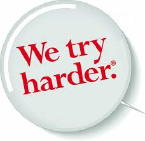 Observe the mess that Twitter made in their feeds, trying to make them look okay in Google Reader (presumably, hard to understand why they borked them so badly otherwise). Their workaround is to repeat the tweet text in both the title and description of the item.
Observe the mess that Twitter made in their feeds, trying to make them look okay in Google Reader (presumably, hard to understand why they borked them so badly otherwise). Their workaround is to repeat the tweet text in both the title and description of the item.
We want to use RSS to do what Twitter does. Maybe for some reason Google doesn't want us to do that. But RSS doesn't care what Google wants. I asked it, and listened. They should listen too.
If Google Reader wants to be the dominant consumer of RSS, then it needs to be a better parent to RSS.
Anyway, there's such a simple way to deal with it.
If you wish an item had a title but it doesn't, see if it has a pubDate, and if it does, use that in place of the title.
Simple rule, and it works. It's what my RSS outliner in the OPML Editor does. A very simple bit of code that's only useful in checking out OPML subscription lists. If a little bit of throwaway code can allow for this, surely the great and mighty Google Reader can too.
Here's a screen shot of how my outliner displays RSS items without titles.
![]()
 How to map a domain to an S3 bucket
How to map a domain to an S3 bucket 
To map a domain to an S3 bucket:
1. Choose a domain name, and on your registrar's site, make it a CNAME for s3.amazonaws.com. For this example I've chosen static.reallysimple.org.
2. Using the AWS Management Console, create a bucket with the same name.
3. Store stuff in the new bucket. You can use the name defined in step 1 to refer to the contents of the bucket created in step 2. Here's the url of a file in my bucket.
That's all there is to it. It's really simple. Amazon did this in a very straightforward and elegant way.
Why would you want to do this? It's neater, and it gives you flexibility down the road if you want to move the content somewhere other than S3.
 I'm famous for my teases
I'm famous for my teases 
I'm famous for my teases. Especially when it comes to things called Radio. ![]()
PS: Want to subscribe?
 Phillip Smith on dynamic OPML
Phillip Smith on dynamic OPML 
Great comment from Phillip Smith on dynamic OPML:
If you could succeed in reviving OPML as the de facto "follow a list" standard, that would indeed be a great step toward bootstrapping a more distributed system of feed reading.
The only thing I'm unclear on is the "dynamic subscriptions." To date, I've not experienced a feed reader that would let me "subscribe" to an OPML source (as much as that makes sense). IIRC, even Google Reader requires one to upload an OPML file, not subscribe to it.
So, I guess the question I have is: Why isn't subscribing to OPML feeds supported in many RSS readers?
My response:
I have my own theories about this, but I want to encourage discussion.
I would add this as item #4 in my recent list of requests for Twitter client apps. Might as well let the user subscribe to OPML as well as RSS.
 Mr Cooper in Tahrir Square during the revolution
Mr Cooper in Tahrir Square during the revolution 
 How many times have you seen American "news people" standing in the middle of a hurricane to "report from the scene." And when you've seen it, have you, like I, said (not on your blog of course) -- "That idiot is going to get himself killed." I suppose that's why people watch it.
How many times have you seen American "news people" standing in the middle of a hurricane to "report from the scene." And when you've seen it, have you, like I, said (not on your blog of course) -- "That idiot is going to get himself killed." I suppose that's why people watch it.
For all I know when Anderson Cooper does it (and he pioneered the form as far as I know) he's in a studio and the whole thing is simulated. But it often looks like a tree or sign is going to come swooping by and knock off his head. In real-time, while kids all over the world watch.
I'm still talking about Anderson Cooper.
I did see the parallels in an idiot standing outside, unprotected, in a hurricane and a rich, white, American standing in the middle of Tahrir Square during a revolution. As spectacularly great as the Egyptian people were during this event, there were assholes floating around out there. Major assholes. People who hate America and Americans. Did Cooper and CNN not know that?
I wonder if they made him sign a disclaimer before he went out there saying that if he was killed his family wouldn't sue CNN for causing his death.
Just some thoughts.
 My rivers and their OPMLs
My rivers and their OPMLs 
 I've done something unusual in the last few months, I've made a few public rivers. I've been publicizing them. Beating the drum. Trying to get people interested. With some good results.
I've done something unusual in the last few months, I've made a few public rivers. I've been publicizing them. Beating the drum. Trying to get people interested. With some good results.
Here are three of them:
1. wikiriver.org.
3. east-village.org.
Today I did something to extend the interestingness. ![]()
If you look in the address bar when viewing each of them, if you use Firefox as I do, you'll see a blue "radiator" icon. If you click on it, you'll get to the OPML subscription list for the river.
Now you can subscribe to the same sources I do. My OPML is automatically updated whenever I add or remove feeds, and if your aggregator supports dynamic subscriptions (also known as reading lists), you'll get exactly the same feeds I have.
By making OPML as readily available for rivers as RSS is for blogs, we're taking the next step in a bootstrap.
Hope you like it! ![]()
 Do you know Eben Moglen?
Do you know Eben Moglen? 
You should. You will. Read on...
Read this piece that just appeared in the NY Times firehose feed.
He likes the plug server form factor. "A small device the size of a cellphone charger, running on a low-power chip. You plug it into the wall and forget about it."
The missing ingredient is sofware. "This month, Mr. Moglen, who now runs the Software Freedom Law Center, spoke to a convention of 2,000 free-software programmers in Brussels, urging them to get to work on the Freedom Box."
"It is not hard, when everybody is just in one big database controlled by Mr. Zuckerberg, to decapitate a revolution by sending an order to Mr. Zuckerberg that he cannot afford to refuse," Mr. Moglen said.
Yup.
 Requests for makers of Twitter client apps
Requests for makers of Twitter client apps 
 A few simple requests for developers who make Twitter clients:
A few simple requests for developers who make Twitter clients:
1. Please create a static archive of your users' tweetstream in a publicly accessible place. Have the URL be a function of their Twitter username.
2. If you're going to use RSS as the archive format, please don't repeat the content of the tweet in both the title and description element of the item. That's the way Twitter did it, apparently status.net copied them. It's a bizarre choice, and requires guesswork to properly deal with on the other end. Pick one or the other. In my application I store the tweet text in the description element. It seems more like a description than a title, to me. Here's my linkstream in RSS.
3. Allow users to subscribe to these feeds. This means your users can follow people who may not be on Twitter. It's a step toward our independence.
 Rebooting the News today at noon
Rebooting the News today at noon 
 We're recording our Rebooting the News podcast in about 40 minutes (as I write this). However in a departure from usual practice, it will not be streamed live to listeners on Blogtalkradio. The reason -- the cost became prohibitive.
We're recording our Rebooting the News podcast in about 40 minutes (as I write this). However in a departure from usual practice, it will not be streamed live to listeners on Blogtalkradio. The reason -- the cost became prohibitive. ![]()
I want you to know that the podcast will be available as an MP3 to download at the usual time (Murphy-willing) at about 1:15PM Eastern.
And if anyone knows a good easy to set up service that relays a phone call to as many people as want to listen in, let me know in the next 15 minutes or so and we can try to set it up. But it has to be right now, there isn't much time. And of course there is always next week.
![]()
 Corporate blogging silos in the news
Corporate blogging silos in the news 
Arianna Huffington is one of those gifted people who have a natural personal warmth that makes you feel like you're her best friend, even if you just met her. It's something a lot of successful people have. Combined with her ability to see through lies, and a willingness to speak her mind honestly, she's one of the most powerful people of our generation.
David Carr, media columnist for the NY Times has a different kind of charm. He speaks in clever ironies, and obviously has a great intellect and has had a tough life, so his jokes have the depth of personal experience.
 It's funny how sometimes stories come in pairs and relate to each other in interesting ways. Carr has a column in today's Times about what I call corporate blogging silos and how the people who make them work, the writers, are uncompensated while the founders (sometimes) get rich. This comes up as an issue when the people working in what I call hamster cages learn how much their work is worth, to the people who own the cages. In the story Carr tells, the owner is the charming Arianna Huffington!
It's funny how sometimes stories come in pairs and relate to each other in interesting ways. Carr has a column in today's Times about what I call corporate blogging silos and how the people who make them work, the writers, are uncompensated while the founders (sometimes) get rich. This comes up as an issue when the people working in what I call hamster cages learn how much their work is worth, to the people who own the cages. In the story Carr tells, the owner is the charming Arianna Huffington!
Meanwhile, Mathew Ingram, writing on GigaOm has observed that both Twitter and Facebook now get that "social news" is the next big thing. Heeere we go. If they wrap up news on the Internet we, who value the truth, are in a lot of trouble. We'll do much better if there are a million personal blogging silos instead of one or two huge corporate blogging silos. The corporate ones are too easy for governments to control without the people knowing they're being controlled. In the case of Twitter, the freedom-loving founders will eventually leave, and the new management will likely care more about return on investment than All The News That's Fit To Tweet. And Facebook has never been about freedom. They desperately want to get into China, as does Google (again) and that's going to involve compromise, at least on behalf of the Chinese populace. What they learn about control can and probably already is being applied around the world, including the US.
I think both Arianna Huffington and David Carr mean well. I don't think, net-net, the tech companies do. At least our version of "means well." My message is this -- it will be way too late to undo the damage once Twitter and Facebook have it locked up. And judging from Ingram's point of view, and Ingram is an honest guy -- they almost have it wrapped up. I'm not sure I agree, but Ingram's point of view is itself important data.
It's time to invest in the open Internet, the zig to the corporate blogging silo zag. No time to waste.
 How I read the news
How I read the news 
Mark Cooper asks, basically, Dave -- how do you stay current?
The core of my news-reading universe is this page.
http://daveriver.scripting.com/
Which I refresh constantly as I work.
I have other tools that I wll describe as we go along. ![]()
 A fractional horsepower news network
A fractional horsepower news network 
 A few years ago I wrote about the need for fractional horsepower HTTP servers. Today, they exist. We take them for granted. Now we're ready to go to the next level. The fractional horsepower news network.
A few years ago I wrote about the need for fractional horsepower HTTP servers. Today, they exist. We take them for granted. Now we're ready to go to the next level. The fractional horsepower news network.
If you recall, the fractional horsepower idea originated with Steve Jobs. That's how he rationalized the Apple II, which people had a hard time understanding because we were just emerging from the Big Iron period of computers. He sold a small computer that looked like a typewriter. He argued, correctly, that people needed computers, not just huge companies and public institutions and the military. I was saying the same thing so when I saw the Apple II, I knew it was for me. Without a moment's hesitation.
When I fell in love with the web, it was the same thing. Here was networking so simple anyone could do it. And look what happened. Everyone did it! Yeah. So what comes next after the web? Ahhh. That's the thing. I think it's the news network. And I think we're still in the Big Iron phase there, but about to enter the Fractional Horsepower stage.
I had dinner the other night with Joe Hewitt who works at Facebook and was one of two guys who started Firefox (the other being Blake Ross). We get together to talk every few months. It's interesting because Joe is so smart, and in some ways reminds me of myself 25 years ago. In other ways we're vastly different. Joe is quiet and I'm anything but. He's quiet but when he speaks he says interesting things.
He suggested that Time may have known what they were doing when they chose Mark Zuckerberg as man of the year. I stopped in my tracks to ponder that. I suppose it's possible. Could have they forseen what would happen in Egypt? I don't see how. But it's an interesting question.
Zuck is just the current last guy in the chain of people who made this all work. There will be more. So it's okay to focus on the individuals, it's the natural human thing to do, but -- it would be like focusing on the gold miners instead of the mine. Or the mystery of why men needed gold to bootstrap an economy. And why we needed an Internet to get us to stand up for each other. The naysayers are right to say the spirit always existed in us, but sometimes magic happens, and it tends to happen when new empowering technology comes fully online.
However, please, before the glow wears off, let's think about what's next.
It's great that Facebook and Twitter did so much for us. But the despots will figure out how to work around them both technically and politically. They're too easy to disrupt. Facebook could go down on its own, the same way Julian Assange can be discovered to wear dirty socks, have four children, and be unkind to cats (in someone's opinion). This justifies shutting his servers off and putting him in jail. (Sorry for the sarcasm.)
They can do the same with Facebook that they do with Assange. There's all kinds of crazy stuff you can do at a firewall to make one site appear to be having technical problems. Real technical problems (but fake ones nonetheless). There are consultants calling on generals all over the world, right now, selling them wonderful Internet dashboards that selectively and randomly make sites appear to have problems of their own, not caused by the government. ![]()
Anticipating this, we have to create communication networks on the Internet that require that the whole Internet be cut off in order for them to be cut off. The reason is simple. The people who are being manipulated will know they're being manipulated. In a centralized social space, there could easily be doubt. I know this is a complicated idea, but the intellects are at work, I promise you. They are smart, we have to be smart too.
It's important that people learn to manage their own infrastructure. It's going to happen, we can do it. We can make servers much easier to set up and maintain, and do more stuff that's meaningful to people like the people in Egypt fighting for freedom. By spreading out we're harder to stop.
The development of the Amazon and Rackspace clouds (and probably others I haven't looked at yet), and virtualization, have made it easy, almost shrinkwrap-easy for people to setup and run servers. Now it's up to guys like Joe and me (and you!) to create server software for those users.
In my new EC2-for-Poets howto (version 2), at the end you're left with your own news aggregator, one that you could share with a workgroup or a community. This is the beginning of a news system that scales down to very small and focused communities. We've got a few users, some real hearty souls, who are working with me step by step. And I just invited a very respected geek friend, Joe Moreno, to join the community and he did. Very slowly, one step at a time.
These moon mission projects are the best. When we know what we're doing has immediate relevance, that's when it's the most fun to create new stuff. The most important thing now is to create something small, fun and easy, a fractional horsepower news network.
A fractional horsepower news network. To me that's the most beautiful idea I've ever heard.
 Microsoft got in trouble doing what Twitter is doing
Microsoft got in trouble doing what Twitter is doing 
One paragraph in an email to a developer list, defines the next drama in the Twitter develosphere.
"We also want to acknowledge that there are going to be some things that developers want to do that just aren't supported by the platform. Rather than granting additional privileges to accommodate those requests, we encourage developers to focus on what's possible within the rich variety of integration options already provided."
I can't tell you for sure what that means, but I can tell you what I think it means. Twitter makes the back-end system and they make apps. They are going to make features available to their apps that are not available to competitive apps. Presumably features that users will want and/or will make Twitter money.
 Microsoft did something like that, connecting their operating system -- Windows -- and their apps: Excel, Word, Powerpoint, et al. There were private APIs that made their apps run better than 1-2-3, WordPerfect, etc. Microsoft denied they were doing it.
Microsoft did something like that, connecting their operating system -- Windows -- and their apps: Excel, Word, Powerpoint, et al. There were private APIs that made their apps run better than 1-2-3, WordPerfect, etc. Microsoft denied they were doing it.
Twitter is not only are they admitting they're doing it, but they're giving developers a heads-up. They may regret doing that, because the developers aren't entirely without options. They also might regret doing it because they are sheltering internal developers from competition, and developers without competition are lazy developers. Hard to motivate.
Regardless, if you develop Twitter apps you should be aware.
 "Find me stuff I'm interested in"
"Find me stuff I'm interested in" 
 I buy lots of stuff on Amazon. Sound systems, clothes, books, gum, vitamins, light bulbs, batteries, hot sauce, cameras -- tons of stuff.
I buy lots of stuff on Amazon. Sound systems, clothes, books, gum, vitamins, light bulbs, batteries, hot sauce, cameras -- tons of stuff.
The Recommendations page on Amazon shows me stuff like the stuff I've bought in the past. They also develop an idea of how often I buy certain things and automatically recommend them when it's possible the last one they sold me is exhausted (vitamins) or needs replacement (toothbrushes).
I was curious to see what 3TB disks sell for now, so I did a search. Now, for the next few weeks I'll see disks and other computer accessories in Recommendation. But over time it will drop off, until I remember to look again.
I spend a lot of time thinking about news, and listening to people's dreams for how a news system works. If I were to distill down everyone's wishes to a single expression it would be this: Find me stuff I'm interested in.
And Amazon has shown us how to do it. Wish I had seen this before.
I have a feed of things I link to, which then flows to River2 subscribers, and through TwitterFeed, to people who follow me on Twitter. Every one of those links is potentially telling my news system that this is something I'm interested in.
When I push a link out not only am I sharing the link with people who follow me, and bookmarking it for future reference -- I could also be informing a news engine of my interests. So then what comes back to me, on my River page, are news items that relate to the things I'm interested in.
I just became the Editor In Chief of my own publication, one that probably has a readership of 1, but a very important demographic (me!).
I'm putting this out there because I want it. Give me back a feed of stories related to the ones in my feed.
This is a great idea for a startup.
 Pages from Computer Lib
Pages from Computer Lib 
I got my copy of Computer Lib/Dream Machines back from Nicco.
I took pictures of a few pages from the book and uploaded them to Flickr so you all can see what it looks like.
It was a seminal book that got a lot of people of my generation started making software that was about freedom and changing the world.
 Why Twitter is so valuable
Why Twitter is so valuable 
 It's the same reason Napster was so valuable before the RIAA shut it down and destroyed it.
It's the same reason Napster was so valuable before the RIAA shut it down and destroyed it.
Napster had captured the entire online music activity under one roof. A virtual monopoly. From there, in hindsight, you could have launched what eventually became iTunes, and had immediate huge market penetration from Day One. Apple would have made devices that hooked into Napster. They wouldn't have controlled the revenue flow of the music industry as they effectively do now.
Same with Twitter. The whole of the microblogging world is under their roof. It's the prototype for the news system of the future. Under competent management with a longer-term view and deep experience with news, Twitter would sweep the whole news landscape into its domain. To have almost exclusive control of the flow of news for a large portion of the world -- could that be worth $10 billion? Obviously, that and a lot more. $10 billion would be a bargain.
The Wall Street Journal employs writers and editors who were schooled in a world where the possibility of wrapping up the whole news platform was unthinkable. That's why they have so much trouble thinking about Twitter.
Hat tip to Felix Salmon for seeing this too, from his own point of view.
 Techmeme moves toward Twitter
Techmeme moves toward Twitter 
Techmeme added an interesting feature a few days ago. It wasn't announced publicly, so I'm not exactly sure how it works, but I'll take some guesses and hope that they get corrected by people in the know.
Here's a screen shot of the current Techmeme site, with arrows pointing at tweets appearing in the discussion sections.
http://scripting.com/images/2011/02/10/tmscreen.gif
1. Techmeme maintains what they call a "whitelist" of Twitter accounts that they regularly read looking for links to pieces that are currently on Techmeme. These people were chosen presumably because their comments tend to be interesting or influential. These were editorial choices.
2. At first I thought the links had to use Techmeme's url-shortener, but now it appears that is not true.
 3. When a comment appears, a link to it is added in the "discussion" section under the post.
3. When a comment appears, a link to it is added in the "discussion" section under the post.
4. Tweets can now be first-class items on Techmeme.
It's interesting that Techmeme has effectively become a surface for Twitter, organizing tweets by topics that are of interest to their readers. It's not certain that this will be compelling, and that the attention from Techmeme might influence what people say.
A few years ago, when flow-hungry bloggers realized that appearing in the "chorus" on TM could result in significant flow, you could watch a story percolate through the tech blogosphere. At times it got ridiculous as people struggled to find something interesting or original to say. That could be even more difficult when 140-character constrained.
Other publications should watch this experiment carefully. Even if it doesn't work with Twitter, it's an interesting model for what an integrated news system might look like in the future.
 Adding a message box to my river
Adding a message box to my river 
I mocked up where I want to go next with the beautiful river stuff.
http://scripting.com/images/2011/02/10/nextStepInRivers.gif
All I did was split the page horizontally and add a box where I can add a message to my output stream. I already have the back-end for this completed and debugged. I have a UI, but it's a pretty ugly HTML form. The goal is to integrate the two.
Here's a screen shot of the form I'm actually using, that's functional.
http://scripting.com/images/2011/02/10/messageEditor.gif
Notes about the editor.
1. The pop-up menu says which feed the item goes to. I can manage more than one.
2. The full link is entered in its own box
3. There's a link to the feed (the white-on-orange XML icon).
4. There's a link that pings TwitterFeed saying the feed has updated.
5. The number is a count of the characters in the box. I'm going to allow you to set a limit and it will turn red whne you go over the limit. (Not implemented yet.)
There's also a message area, to the right of the popup-menu, but since there is no message being displayed you can't see it. This is for confirmation messages like "Updated feed" or "Successfully pinged TwitterFeed."
I see this evolving quite a bit, but this is the core functionality. With these two pieces integrated, there will be the equivalent of a Twitter client that only uses RSS to communicate.
Cross-posted on the River of News list.
 Will JSON replace XML in RSS?
Will JSON replace XML in RSS? 
A frequently asked question goes something like this.
"I like JSON. What if apps started publishing RSS data in JSON."
1. My first answer: Sure, why not. I experimented with it in October, and found prior art -- a website that takes a feed and returns JSON.
2. I wrote both ends of a protocol that depended on JSONified RSS. It worked. I didn't find any dead-ends.
3. Now, that doesn't mean there aren't any dead-ends. If I were a betting man, based on past experience, I'd expect there are. But they wouldn't necessarily be the end of the process. It depends on how determined one is, and if a consensus can be arrived at as to which of the possible egregious hacks would be used to back out of the dead-end.
 4. Motivation. Now there's the really big problem. Why would anyone be willing to recode their RSS support to use JSONified RSS? I did it as an interesting hack, a diversion, something to pass the time while my brain warmed up for other work.
4. Motivation. Now there's the really big problem. Why would anyone be willing to recode their RSS support to use JSONified RSS? I did it as an interesting hack, a diversion, something to pass the time while my brain warmed up for other work.
5. If you run a news site, could you replace your XML-based feeds with JSON without losing a bunch of readers and potential readers. So you'd be stuck supporting both, for the indefinite future. Congratulations, you just made your life more complicated. What did you get in return?
6. But the world is switching to JSON. Isn't it? Answer -- yes, that does seem to be happening. For new applications. If it's going to happen in an existing app, like HTML or RSS, it's a very long way off. Do a view-source on any web page. See all those angle-brackets? Now think about all the brains that know how to do that. Installed bases like that come, at most, once in a generation. You can't wish them out of existence. If XML is meant to be replaced by JSON, that process will take many many years.
So RSS in JSON is technically a real possibility.
Will it happen? I wouldn't bet either way. It might happen. That doesn't necessarily mean it's a good idea. Or that it's not a good idea.
Will it replace XML-based RSS? Obviously, I don't think so.
 A river of news in JSON
A river of news in JSON 
Way back in December 1997, I wrote about Scripting News in XML. "One of the promises of XML is that it will make it possible to have different kinds of browsers, custom-built to present specialized content flows."
 And while some angry nerds (heh) will disagree, for sure -- that was the beginning of RSS. The first moment a blog post crawled up on an aggregator and said Hello World.
And while some angry nerds (heh) will disagree, for sure -- that was the beginning of RSS. The first moment a blog post crawled up on an aggregator and said Hello World.
So maybe what I am about to show you now will also lead to some big things? I think it will. ![]()
Here's the deal.
I like to read my news in what I call a river. It's a very simple idea. Read a feed. If there are any new items put them on a raft and float them down the river. Read another feed, etc etc. Yadda yadda. Over and over, for all time.
If you like Twitter or Facebook, it should sound familiar. Of course rivers existed before Twitter and Facebook, as many people will point out. A teletype is a river. The first websites were rivers, as are all blogs. It's a natural step to make our RSS readers work the same way.
For example, here's how I read my news.
http://daveriver.scripting.com/
Now if you pop the hood, and view source on that page, you'll see that it's a JavaScript application that gets its data from a JSON file.
http://daveriver.scripting.com/river3.js
If you look at that file, you'll see what a river looks like in code.
As with RSS, it's so simple that you could almost read it without an application. I hope all the names of elements make sense. I strived for simplicity and obviousness.
If you want to build an application that reads this river, please do. Try to read it no more often than once every ten minutes. To read it more often is pointless, that's how often it changes. And don't be shy, if you develop something using this data, show us what it looks like...
Here we go again! ![]()
 Join your community on the Internet
Join your community on the Internet 
 Twenty years ago a news org had a community, and tools for communicating with it. That pretty much defined what a newspaper was. It still does, but the inputs and outputs work differently than they did in the past. And news orgs are just slowly catching up.
Twenty years ago a news org had a community, and tools for communicating with it. That pretty much defined what a newspaper was. It still does, but the inputs and outputs work differently than they did in the past. And news orgs are just slowly catching up.
Rather than explain how it worked in the past, something everyone is familiar with, let's try to understand how it works today.
1. The audience is on the Internet. Obviously true for written publications, and about to become equally true for video news. Audio is different because of cars, where broadcast still has a big role, but that will decline over time.
2. Sources are also on the Internet. Everyone's sources. Reporters, find your quotes on the net and link to them. Stop asking for phone interviews. Everyone else: write a blog post and say what you really think. Don't dumb it down.
3. News is an environment, not a publication. The front pages of news sites are irrelevant. I can't remember the last time I went to the home page of any site when I wasn't just looking for the address of a feed.
3a. So how do you find the news stories. A myriad of ways. All of which can be outside of corporate blogging silos, and very soon everyone will see why this is so important. It's not like there will be a big revelation, but gradually the corporate sites will restrict their use such that the things we want to use them for will not be possible. Facebook is already doing this by having a clear policy that people must use their real names. They've always had this policy so it's nothing new, and it's not wrong. What would be wrong would be to ignore it, and assume Facebook is useful for everything the Internet is useful for.
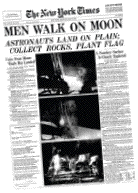 3b. And where do you park your electronic Internet keister? Aha! That's a problem y'all forgot to solve. You're using Twitter and Facebook. But really that's not going to work long-term. We need to all put our heads together and figure this one out. How will news work on the Internet next year and the year after. That's your job Mr and Ms Journalist and Editor and J-school professor, to figure that out. The kids in Silicon Valley don't have the first clue, so stop looking to them.
3b. And where do you park your electronic Internet keister? Aha! That's a problem y'all forgot to solve. You're using Twitter and Facebook. But really that's not going to work long-term. We need to all put our heads together and figure this one out. How will news work on the Internet next year and the year after. That's your job Mr and Ms Journalist and Editor and J-school professor, to figure that out. The kids in Silicon Valley don't have the first clue, so stop looking to them.
4. Reporters and editors have to worry about bridges in places you didn't have to before. It used to be you had to be careful with a handful of egos, because you needed them as sources (organizations leak at the top) and because you had to put them on the cover once a year. Now you have to be careful not to take shots at someone you might need as a source next week and you never know who that might be (did you know that Egypt would turn out to be a hot story). That's how journalism was supposed to work, btw, imho. You shouldn't be out there burning bridges, breaking deals, talking stupid trash about people doing important work. Again, no one cares about Julian Assange's socks. That is so wrong. Don't burn the bridges, or at least don't burn them just for the fun of it.
5. Please pay attention to your readers/viewers/listeners' interests. That's one very important reason you use Twitter, not just to broadcast your stories, but also to be influenced by what others say and do. This may be the biggest change in journalism in the age of the Internet.
 6. I said in our podcast yesterday that press organizations should draw their communities closer to them, but that doesn't go far enough. You must join your community. It's already on the net. Stop feeling like you're on top of us and we're "down there." That is no longer what's going on. We're all around you. One day we might be readers, the next day we're your source, but -- get this -- we're still the same person every damned day no matter what we look like to you. There's a role for you to play. While WikiLeaks shuffled the deck it did prove that we need professional journalists, but it's different today from what it was in the past. Big deal. That's good! We have a chance to make the world work better. Finally.
6. I said in our podcast yesterday that press organizations should draw their communities closer to them, but that doesn't go far enough. You must join your community. It's already on the net. Stop feeling like you're on top of us and we're "down there." That is no longer what's going on. We're all around you. One day we might be readers, the next day we're your source, but -- get this -- we're still the same person every damned day no matter what we look like to you. There's a role for you to play. While WikiLeaks shuffled the deck it did prove that we need professional journalists, but it's different today from what it was in the past. Big deal. That's good! We have a chance to make the world work better. Finally.
That's the bottom line. Tatoo that on your forehead so you see it when you're shaving or putting on your makeup in the morning...
Join your community on the Internet.
Over and out.
 Why I feel good about staying with RSS
Why I feel good about staying with RSS 
 I feel good about staying with RSS.
I feel good about staying with RSS.
It's a good gateway. I realized that this morning when I finished a user-facing feature that builds on TwitterFeed. Why should I worry about how to connect to Twitter. It's become a chore to keep up with their APIs and various conceptual complexities. Let the TwitterFeed guys do that. I can leverage all their work by simply outputting RSS.
If you want a 140-character limit, then don't use more than 140 characters. If you find it ridiculously confining (try to have a "discussion" about any real subject in 140-char chunks and you realize it's hopeless) then write at the length that works for you. If people don't want to read your ramblings, they won't read them. You learn how to make your ideas persuasive, and gauge the interest of the people you're talking to.
I feel comfortable rambling here a bit, because my readers are highly intelligent and are receptive to new ideas. And you guys are accustomed to me rambling. ![]()
It's remarkable how things always come back to the tried-and-true ideas. Does this sound a lot like Dogma 2000 to you? It does to me.
Something else that's really cool about TwitterFeed. I store my stuff where I want to and then tell them where I put it. This is so much more rational that the other approach, where I give my stuff to a website and they decide how I can access it. And of course they can change the rules anytime. See how much better the RSS approach works.
PS: This was inspired by a post on Joe Moon's blog.
 The Internet is for revolution
The Internet is for revolution 
Does Facebook want their service to be used by Egyptians to overthrow their government? Probably not. They're trying to get China to let them in.
Chinese Internet censors don't want the people to hear about Egypt.
Zuckerberg went to China, very visibly. Google has been there, and withdrawn, and now would probably like to go back.
What does Facebook tell China when they ask if Facebook can be used to overthrow governments?
 When people think of the revolution in Egypt happening on Facebook and Twitter, what they really need to know is that these two corporate-owned websites are part of the Internet. It is that part that is useful to revolutionaries. The corporate side of their existence is an opposing force, because the tug of governments and profits makes them want their services to not be used for revolution.
When people think of the revolution in Egypt happening on Facebook and Twitter, what they really need to know is that these two corporate-owned websites are part of the Internet. It is that part that is useful to revolutionaries. The corporate side of their existence is an opposing force, because the tug of governments and profits makes them want their services to not be used for revolution.
This will become more obvious over time. It's why we must develop systems that are equal to Twitter and Facebook, but that aren't so easy to block.
We must make it so that a country, if it wants to turn off Internet-enabled revolution, must turn off the Internet itself.
BTW, this is something the VC community can agree with, imho. The evolution of social media to the edges will just create opportunities for new products, new startups, more money. As Bruce Sterling says, we're always centralizing then decentralizing then centralizing. It's the pulse of tech.
 Can I write a Scripting2 blog post here?
Can I write a Scripting2 blog post here? 
This is a test to see if I can manage to write a Scripting2 blog post here in the instant outliner. Let me enumerate the things I would have to do to make that work.
1. Add a New Post button to the "My Outline" window. A dialog appears asking the title of the post. It calls to the server the same way the button in the Scripting2 window does. If it works, a headline appears with your title in it. (You can of course change it whenever you like.)
2. Saving. Your changes would have to go to both servers, to the I/O server and to the Scripting2 server. This is going to be the tricky part.
The answer is yes indeed. I can write a blog post in the Instant Outliner.
Parts -- all released -- 2/5/11; 3:50:17 PM by DW
 They zig when they should zag
They zig when they should zag 
 I watched the Thursday night video feed of the Columbia panel on Wikileaks instead of going there in person. After trying to listen to Keller on Fresh Air and giving up half-way through, in disgust -- I just couldn't imagine sitting through his schpiel about the social behavior problems (he perceives) of Julian Assange. I don't care, and frankly I think it's irresponsible of a person in Keller's position to take the focus off the substance, which is so interesting and vital.
I watched the Thursday night video feed of the Columbia panel on Wikileaks instead of going there in person. After trying to listen to Keller on Fresh Air and giving up half-way through, in disgust -- I just couldn't imagine sitting through his schpiel about the social behavior problems (he perceives) of Julian Assange. I don't care, and frankly I think it's irresponsible of a person in Keller's position to take the focus off the substance, which is so interesting and vital.
Emily Bell, the interviewer, kept the discussion away from Assange's socks, and got some very interesting things on the record from the panel. For the purposes of this story though, I'm only going to look at one new bit of info. Both the Times and the Guardian are thinking about replacing the technology of WikiLeaks with their own. Instead, imho they should be thinking about creating their own Twitters, platforms for their news people to congregate in realtime and mix with the members of their communities. Both organizations should be doing much more to cultivate community. And Twitter is much more of a threat to them than WikiLeaks.
It was so revealing when Keller said that his audience had moved to the Internet. Yes, but.. His sources have too. And there are so many more sources today than there were when we were growing up. It may be the biggest single change in the way news works.
Understanding the social aspect of news, and leading us with great information and gestalts -- that's what the Times and Guardian do best. It's less important how the leaks make their way to their desks. News is now an environment, not a publication. It lives and breathes. That's what the news orgs still haven't been willing to embrace.
Fox is missing the point too, moving in the wrong direction, back onto a stage, and emphasizing the audience-ness of all of the rest of us instead of mixing with a sea of sources.
I got a comment here from the guy who runs the web side of Al Jazeera. It was more than gracious and totally appreciated.
One more thing, both the Times and Guardian said they would stand "shoulder to shoulder" with Assange if the government prosecutes. That's quite a relief and much appreciated. I thought all this trash talk about Assange was a prelude to their abandoning him. Glad adult sensibilities are showing up here, and it's nice to see the mainstream press stand up for Internet press. It hasn't always worked that way you know.
 Following-up on deck.ly
Following-up on deck.ly 
Earlier this week I wrote a brief piece about the questions raised by Tweetdeck's new deck.ly service, but didn't hear from anyone at the company re the intent of the product.
So I sent an email to Iain Dodsworth, the creator of the product and CEO of the company asking for follow-up, two days ago. Dodsworth and I had communicated in the past about the product and approaches to connecting it with other elements of the "twittersphere" via RSS.
It's a very important offering, and it's important to know what, exactly, it is -- and how open it is to Tweetdeck's competitors. Those that exist now, and those that might exist in the future. Users should want to know how accessible their ideas are outside of Tweetdeck's silo. Can it participate in an ecosystem, or is it forever locked-in? Or something inbetween?
Please, people at Tweetdeck, can we begin an open exploration of your product?
Thanks...
 No feeds on The Daily
No feeds on The Daily 
I asked a PR person for The Daily, announced yesterday, if they had feeds. I got back a definitive answer: No.
Here's a screen shot of the email.
However, re-reading the answer I'm concerned she misunderstood the question. If they do actually have feeds I can plug into my aggregator, perhaps someone from their organization will post a comment. Thanks!
 Should we trust Bill Keller?
Should we trust Bill Keller? 
In the decade-long debate about the future of news and blogging, the defenders of professional journalism always fall back on long-term investigative work for justification. The argument goes as follows. Blogging may be the domain of primary sources and the individuals they used to quote in everyday pieces now have their own blogs. But investigative journalism, working the sources, that's expensive. You need pros to do that work.
 This always struck me as naive. The forward march of technology rarely leaves structures intact. Our economy has a completely different shape after the Internet.
This always struck me as naive. The forward march of technology rarely leaves structures intact. Our economy has a completely different shape after the Internet.
And then along comes WikiLeaks to prove that even investigative journalism works differently with the advent of the Internet. But that's okay, because finally -- the mainstream guys, instead of fighting Internet-inspired change, see the opportunity and are embracing it! The Times, Guardian, Spiegel et al, have been working with WikiLeaks to establish a publishing workflow that protects sources and gets readers the information we need. Before judging the Times as wholly ineffective and dishonest, let's acknowledge that someone down there is doing their job. They may not like Julian Assange, but that's life. We all have to do things we don't like. Or you could just sit it out.
The Times has said that they may operate their own leaks site, but for now that seems as pointless as Assange saying he's going to replace the pros with volunteers. That was his first approach. It would have been mine too, because I have a basic distrust of the big pubs. And the Keller-led smear job of Assange is providing a good reminder of why it's correct to distrust them.
But the smear job is not going to work, because the issue is not Julian Assange. I've been on the receiving end of this kind of smear campaign, and it's not pleasant. But once there's more than one way for leaks to flow over the net, and that day is already here, you're just playing whac-a-mole by pretending you can make it personal and win. It ain't personal.
 All along I've been saying to the pros that what I want to do is work with you, not against you. If you listen carefully Assange is saying the same thing. I know it's tough to find in mid-late middle age, after having climbed to the top of the ladder in your profession, that the ladder is tottering and it looks like it's going away. But if you want your organizations to continue, you're going to have to stop fighting change and start going with the flow. We are going to get more visibility into the way the government and economy work. The people who are scared of us seeing what we will see need to change their ways. Now.
All along I've been saying to the pros that what I want to do is work with you, not against you. If you listen carefully Assange is saying the same thing. I know it's tough to find in mid-late middle age, after having climbed to the top of the ladder in your profession, that the ladder is tottering and it looks like it's going away. But if you want your organizations to continue, you're going to have to stop fighting change and start going with the flow. We are going to get more visibility into the way the government and economy work. The people who are scared of us seeing what we will see need to change their ways. Now.
In a way, if we care about being informed, there's not a whole lot of difference between Mubarek in Egypt and the mainstream press in the US. They're all part of an old comfortable system that has left most people out and on the sidelines. What we're saying now is that we are involved, and we want to know what's going on, in specifics. No more bedtime stories like the one with the ogre Julian Assange and the white knight Bill Keller. When we have to make decisions we don't want the distractions of personal smears, rather we want to know where the money is going and who's getting fucked to make our government and oligarchs richer and look good.
One more thing. We must also have visibility into the news organizations if we're going to trust them, the same way we have visibility into the government. Certainly someone in the Times organization knew that Judith Miller was tight with Scooter Libby before the story broke publicly? Where is the dropbox that Times insiders can leave anonymous clues for those outside their organization who would like to know what they are not disclosing voluntarily.
PS: Expect a movie about Assange's socks, based on Keller's smear in the NYT Magazine.
 Does Assange have an agenda?
Does Assange have an agenda? 
Does Julian Assange have an agenda? We've heard the question so many times, usually asked by American media, whose agendas we are intimately familiar with. My answer, on reflection, is yes, I think he has one, and he has said what it is. And it's not what the big media people insinuate that it is, although that's not usually made very clear. If they think he has an inappropriate agenda, perhaps they should say specifically what they think it is, and back it up.
In this Sunday's interview on 60 Minutes, Steve Kroft asked if he is an activist. Assange said: "We are free press activists. It's not about saving the whales. It's about giving people the information they need to support whaling or not support whaling. Why? That is the raw ingredients that is needed to make a just and civil society. And without that you're just sailing in the dark."
That's a pretty good explanation of what journalism is about, imho. It's what I look for in journalism, and where I have expertise, it's what I strive for as well. And so often it's the problem with what American journalists do, they raise questions and then try to answer them with vital information missing. "Sailing in the dark," that's most of what we do, unfortunately.
In a four-part documentary that we included here on Scripting News, Assange said clearly that he wants to expose the truth about the war in Iraq. American news has not done a very good job of this, yet we have had to make huge decisions that determine the outcome of countries and the world's economy, without the information we need. It's also clear that Assange has helped. It's a pretty good agenda, imho. In the same interview he said he hoped that leaders would be more careful about what they do in the future, and that they would if they were sure that it would eventually come out. I think even a radical right-winger like Rush Limbaugh could get behind that. The problem is a lot of our media leaders aren't comfortable with this idea, apparently.
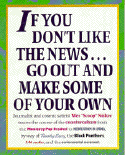 Another question that comes up is whether the release of WikiLeaks documents could be responsible for the deaths of innocent people. This is a question that must be asked of all news organizations, not just WikiLeaks. You can't avoid it. A responsible journalist tries to minimize the harm that comes from the publication of information, but it's not his or her responsiblity. A journalist's responsibility is to an informed readership. If that's not where their focus is, then they're in the wrong business.
Another question that comes up is whether the release of WikiLeaks documents could be responsible for the deaths of innocent people. This is a question that must be asked of all news organizations, not just WikiLeaks. You can't avoid it. A responsible journalist tries to minimize the harm that comes from the publication of information, but it's not his or her responsiblity. A journalist's responsibility is to an informed readership. If that's not where their focus is, then they're in the wrong business.
However, this is what made my chin drop listening to Bill Keller on Fresh Air early this week. He responded to this question about Assange, without answering it himself. That's a big problem. (Terry Gross, his interviewer, should have answered it as well.)
Anyway, of course everyone has an agenda. Mine is to take another breath, and for my heart to keep beating. I have causes I believe in, and I like to live well, in comfort. That doesn't mean I can't do good work and have principles that I stand for.
Overall, it's an embarassment the way American journalists conduct themselves re Assange and WikiLeaks. We can easily see the contradictions and faked naivete in their questions. They must not care that we see it. Steve Kroft of 60 Minutes apparently doesn't understand how journalism works, because every question he asked of Assange called for a basic tutorial on American civics. Bill Keller would have us believe that you can practice journalism without taking risks, or that you can be a human being without offending some people. Please, can we stick to what's important. In the case of Assange, his socks, believe it or not, are an issue -- according to Keller. He doesn't like his socks. Help. Someone tell Keller that even a child can see through this.
The reason I write this now is that tomorrow evening I am supposed to see Keller tell this story -- and I don't know how I will be able to sit for it. Maybe by writing it in advance, it will somehow make its way to his desk, or to the desk of his interviewer, and he can address tomorrow's audience with a bit more respect than he did to the listeners of Fresh Air, or the readers of the NY Times Magazine. (I linked to the print version of the Times article because I found the graphic portrayal of Assange so offensive. I wonder if the Times would run a picture of Keller that was so defaced.)
Finally, i's not so much the way he treats Assange that I find offensive -- Assange is, amazingly, able to sit still and not show outrage at the childishness and hypocrisy of the insinuations. It's the way these people treat their audiences. It's as if we are uneducated and unintelligent. I remember a time when both 60 Minutes and the Times had too much dignity for that. Let's go back there, okay?
 CNN falls into the abyss
CNN falls into the abyss 
 First -- what's happening in Egypt is awful. The US was taking the wrong approach -- Mubarkek isn't really a dictator, but that changed, and the President's remarks yesterday were right on the money. We can't get too involved, publicly -- because Egypt is a sovereign country. But please, an 83-year-old man needs to be thinking seriously about moving on, and it's pretty clear that until the popular uprising Mubarek wasn't planning on leaving any time soon.
First -- what's happening in Egypt is awful. The US was taking the wrong approach -- Mubarkek isn't really a dictator, but that changed, and the President's remarks yesterday were right on the money. We can't get too involved, publicly -- because Egypt is a sovereign country. But please, an 83-year-old man needs to be thinking seriously about moving on, and it's pretty clear that until the popular uprising Mubarek wasn't planning on leaving any time soon.
But.. This blog is called Scripting News, so we're focused on media and from our point of view the big story is that cable is punting bigtime and the Internet is, finally, coming into its own as the source of realtime video news -- thanks to the excellent coverage of Al Jazeera.
As Doc Searls explained so well in this week's Rebooting the News, we don't need the settop box to connect to video sources, the web is perfectly capable of doing it. Now, I can watch CNN and other news networks on my computers thanks to Slingbox, but every time I try, I get disgusted and turn it off. Now, I can tune into Al Jazeera and feel that at least they're trying to give me good information
Al Jazeera is not perfect. They have some of the same problems as American news. For example they accept the fiction that the people who invaded Tahrir Square today were "pro-Mubarek supporters" when they so obviously are agents of the government. But on the whole, they are doing the job we want them to do, the same kind of work that CNN was doing in the early 90s when they were covering the Gulf War, their moment of peak greatness.
So, what happens now?
Al Jazeera offered their feed to CNN, but apparently CNN didn't take it (I don't know for sure, as I said earlier I was part of the great news blackout that covers the US where the Internet doesn't reach in full broadband strength). In the conference rooms at Time-Warner they must now realize that they have to offer their full video news feed for free via the web. And they need to show Wolf Blitzer the door, and get a new generation of news people in there, who ask the hard questions, and call bullshit for what it is when they talking heads start spouting. Let's scare the crap off the wire, and replace it with people who believe in the American values of bravery and freedom.
CNN's downfall could have been headed off by allowing Al Jazeera onto our cable networks, and not protecting American corporate media from the upstart from Qatar. I'm sure that will now happen, but -- it's already too late. The web won this one, and cable is now history, for news. And the rest of it is not very far behind.
Don't miss it -- while the passion and courage of Egypt is ridding itself of the tyrant Mubarek, the United States will eliminate the mediocrity of CNN, thanks to the excellence of Al Jazeera.





